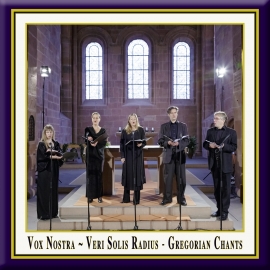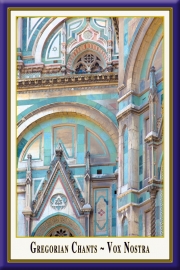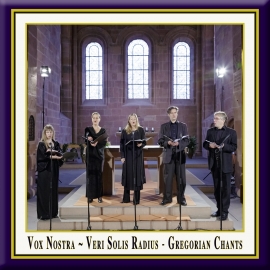Vox Nostra


Vox Nostra ~ Vocal Ensemble
Vox Nostra is a vocal ensemble based in Berlin, Germany, founded in 1999 by Burkard Wehner. Specialized in the performance of medieval music the main focus of the group is the interpretation of the earliest surviving compositions from the cultural centers of Europe. Sung from manuscripts originating in monasteries, cathedrals, and courts, this music is an acoustical insight into the archaic sound world of the Middle Ages. The members of Vox Nostra have pursued extensive scholarship in the fields of musicology, medieval paleography, and theology. The music of Vox Nostra combines expressive musicality and academic curiosity. The repertoire includes Gregorian and pre-Gregorian chant and the specific liturgical music of the different medieval orders like Cistercians, Dominicans, Carthusians and Franciscans dating from the 10th to the 14th century. Furthermore Vox Nostra sings early polyphony from the 12th to the 14th century and the richly polyphonic compositions of the Renaissance. A special feature of the ensemble is the practice of singing scores researched from original manuscripts. The musical interpretation made by Vox Nostra has specific consequences on the old forms of notation, such as neumatic notation of the chorale, the modal notation of the Notre-Dame organa, and mensural notation. In order to give these features the emphasis they deserve, ensemble Vox Nostra favours a slow, flowing style of performance in an appropriately restrained tempo. The vocal sound which results is rich in overtones, and fills the entire space; it allows the archaic and pure intervals of this music to be fully appreciated, and ensures that the complex weaving of the individual voices is clearly audible. In addition to the original manuscripts, research and this interpretation of the music from the 12th-16th centuries also provides new information the regarding tempo, ornamentation and the practice of solo performance of the chants. The unique acoustical situation of each concert location influences concert presentations, as well as the choreography of singers, hence time in each venue to work how the singers can move between various points in the room to integrate the acoustic properties of each site into the score.The leader of the Ensemble, Burkard Wehner, was born in Steinach an der Saale /Unterfranken. Study of German and Theology at the Julius-Maximilian University Würzburg. Study of "Medieval and Renaissance Vocal Music", and musicology at the Brabant Conservatory in Tilburg, Holland. International master classes with Andrea von Ramm, Jill Feldman, Marcel Pérès and Pedro Memelsdorff. Soloist at many international festivals in Poland, Holland, Austria, France, and Germany. Musical advisor to many medieval ensembles. Extensive musicological activity in the research of medieval source material. Instructor in the field of music sociology at the Humboldt University, Berlin. Teaches workshops and seminars on the interpretation and performance practice of medieval vocal music. Director of the Baroque opera Zenobia from Tommaso Albioni (1694) for the Syrian National Opera Damascus / Cultural Capital Damascus 2008. Member of the advisory board for the exhibition 'The Council of Constance 1414-1418' in Constance from April to September 2014. Lives and works in Berlin.











